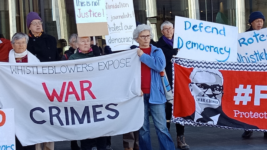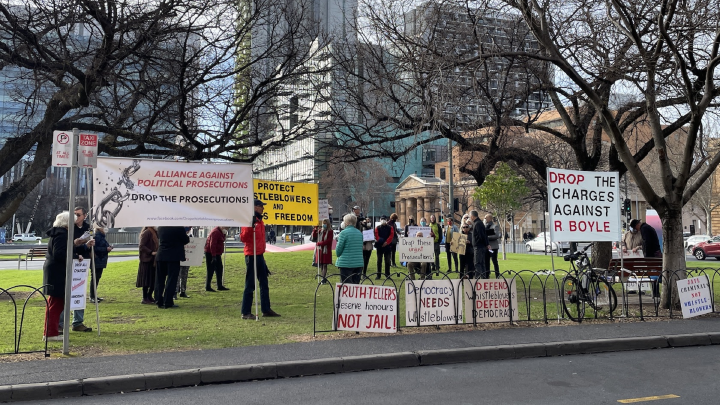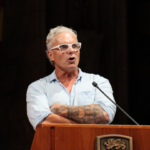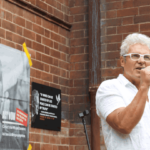“Our Democracy Needs Whistleblowers”: AAPP’s Kathryn Kelly on the Unjust Prosecutions

The SA District Court recently informed ATO whistleblower Richard Boyle that the laws drafted by attorney general Mark Dreyfus a decade ago, do provide immunity from civil, criminal and administrative liability in making his disclosure, but not for his actions in obtaining the evidence.
Boyle is being pursued by authorities over his having exposed the Australian Taxation Office as having wrongly commenced employing garnishee practices that were reserved for habitual tax breachers across the board in mid-2017, in an end of financial year effort to raise revenue.
Judge Liesl Kudelka outlined that if she’d followed Boyle’s argument to its logical end, it would amount to sanctioning a form of “vigilante justice”, as such an interpretation of the law would permit “unlawful conduct” ranging from the “minor to egregious”.
Yet, the whistleblower laws set out in the Public Interest Disclosure Act 2013 (Cth) are supposed to protect public servants aware of government corruption in putting together a disclosure to submit to their employer, as well as providing the path to take in blowing the whistle.
A bipartisan approach
When Dreyfus was appointed to the position of AG for a second time following last May’s federal election, the Labor member inherited three controversial whistleblower prosecutions: ACT barrister Bernard Collaery, former ADF lawyer David McBride and Boyle.
However, Dreyfus dropped the case against Collaery last July. The chief lawmaker was able to do this via section 71 of the Judiciary Act 1903 (Cth), which empowers the AG to discontinue a prosecution against a person charged with “an indictable offence against the laws of the Commonwealth”.
And when Australians Against Political Prosecutions (AAPP) quizzed Dreyfus as to why he let Collaery off the hook, but determined to pursue Boyle and McBride, the attorney simply replied that the section 71 power is only meant to be used in “very unusual or exceptional circumstances”.
Key differences between Collaery’s case and that of the other two are that he wasn’t the primary public service source of the information divulged, and he’d also been taking legal steps to lift the suppression orders covering his case, which hid politically embarrassing information.
“Punishment via process”
Boyle is now set to appeal the outcome of his public interest disclosure defence. But as for McBride, the lawyer didn’t even get to utilise the laws within the PID Act, as the prosecution made it so difficult for him to argue his defence that his legal team decided to discontinue it.
McBride is set to go before the ACT Supreme Court on 11 April to set a date for the commencement of his criminal trial. And AAPP will be holding a demonstration in support of the former ADF lawyer, who served two tours in Afghanistan, out the front of the court next Tuesday morning.
Sydney Criminal Lawyers spoke to Australians Against Political Prosecutions co-convenor Kathryn Kelly about the positive role whistleblowers play in our democracy, the Australian government’s pursuit of them as criminals, and whether Dreyfus’ PID amendments are likely to work this time.

Kathryn, the South Australian District Court handed down its ruling on Richard Boyle’s public interest disclosure defence on 27 March.
Judge Liesl Kudelka found that whilst the Public Interest Disclosure Act provided Boyle with immunity from liability in terms of submitting his disclosure, it doesn’t cover the actions he took in gathering the evidence to support his case.
What are your thoughts about this interpretation of the PID Act and the outcome for Boyle?
It was very disappointing that Judge Kudelka disallowed the actions for investigation of the disclosure.
That sounds a bad message to those considering whistleblowing. And it’s likely that he’ll appeal, which is good because that needs to be challenged.
Richard was charged in 2019. He was initially charged with 66 offences, which has gone down to 24 after there were questions asked in the Senate. And his actions have been completely vindicated as the tax office changed their practices.
So, this is really a catastrophic decision for whistleblowers. And hopefully, if he does appeal, which looks likely, then it will be looked at again.
The PID Act was drafted by attorney general Mark Dreyfus. Before taking the office of chief lawmaker for a second time, he advised that he was aware that his laws were wanting, and he’s committed to overhauling them.
While last November, a month after Boyle had argued his defence under the PID Act, Dreyfus released legislation containing his initial amendments.
So, what do you think about the order of these events? Should Boyle have been left to attempt to save his liberty under dodgy law?
Certainly not. He shouldn’t have been left to do that. Dreyfus knows the PID Act is not fit for purpose. And he ought to have dropped the cases against Boyle and McBride, at the same time as he dropped Bernard Collaery’s case.
It’s unfathomable why Dreyfus hasn’t dropped the other cases so far.
He says he can’t interfere in legal processes, but that’s what the clauses in the Judiciary Act that allow him to were designed for. Those clauses are for these situations where an unjust prosecution is taking place.
The cases don’t comply with the prosecution policy of the Commonwealth Director of Public Prosecutions.
That policy says that there are public interest factors in proceeding with prosecutions, for example the seriousness of offence or the need for deterrence. But neither of these cases are in accordance with that.
Neither case involves serious offences. And what’s the need for deterrence? We shouldn’t be deterring our whistleblowers. Our democracy needs whistleblowers.
I’m not sure if you call it hypocritical or unfeeling that Dreyfus went ahead with the prosecutions when he knows the PID Act is not good enough. It’s hard to answer that.
David McBride’s case is the other prominent political prosecution still underway. At recent events, the ex-ADF lawyer has been suggesting he’s likely to serve time.
Indeed, when McBride attempted to put his PID defence to the court, the prosecution made it so difficult that his lawyer dropped the case.
How do you consider the way the authorities are pursuing McBride’s prosecution?
Similarly, this is unfathomable. One person is now being prosecuted for war crimes. But we still have David McBride being prosecuted for talking about them.
Whether they would have been investigated without him talking about it early on is quite doubtful. The Brereton inquiry has verified his actions.
So, again, it’s hard to understand how they’re continuing with the prosecution.
But I do know that at the time of his PID hearing, when they disallowed David’s witnesses to be heard through an immunity order, there was some suggestion that “foreign partners” were not happy with what witnesses might say.
Dreyfus commenced his tenure with the dropping of the Collaery prosecution last July.
AAPP has suggested that the AG should have backed this action up by overturning Witness K’s conviction. And you’ve also questioned why Collaery’s case was dropped, but not that of Boyle and McBride.
Key differences between the Collaery case and those of McBride, Boyle and K are that Bernard was not the direct public service whistleblower and he looked to be successfully pushing back at suppression orders on evidence that government players would prefer are kept secret.
So, why do you think the Collaery prosecution was brought to an end, while the other three cases were left as they were when Labor took office?
Relations with Timor-Leste were a significant factor in that. Timor-Leste was not particularly happy when that was going on.
Australia was afraid that Timor-Leste might turn to China and allow things to happen that they wouldn’t like.
That was one reason. Another is that the ALP continued to cover up the Timor-Leste bugging. Gillard denied the bugging had taken place. Then Carr and Dreyfus put out a media release in 2013 talking about the bugging. So, they’d played a role.
Another nasty thing that happened is that the existence of the helium that was going to be taken out with the gas was not revealed to Timor-Leste and it didn’t play a part in the negotiations.
The benefit of the helium went completely to the companies. The Commonwealth had no benefit from it either. That’s a serious thing, that the Commonwealth lost out on it. And a Commonwealth deception led to that.
Some of that is in Bernard’s book. And I hope there’s an investigation of the Timor-Leste bugging, whether that be through a Royal Commission or the National Anti-Corruption Commission.
Although it is hard to see that will happen with Dreyfus carrying on in the way that he is.
Australia was meant to be negotiating “in good faith” with those Timor Sea resources. But it’s clear they weren’t. It’s all been renegotiated now. It’s not such an issue, but it certainly was at the time.
Dreyfus drafted the current PID Act. The 2016 Moss report made 33 recommendations to improve it. And now the current attorney general is in the midst of doing just that.
Considering his first attempt at drafting whistleblower protections failed to protect those who speak out about government corruption, do you have much hope that Dreyfus’ second try will be more successful, especially as he’s decided to continue the pursuit of Boyle and McBride?
I haven’t heard anything about the amendments covering pre-PID investigations, so it looks like it probably won’t fix that problem.
In the future, they’re going to be looking at a whistleblower authority. But they haven’t released the further amendments that they plan to make on top of the ones that are now before parliament.
So, there’s quite a worry for people looking into this in more detail, like lawyer Kieran Pender and Professor AJ Brown from Griffith University.
It looks to me like Dreyfus is doing a piecemeal job that won’t actually fix the main problems in the PID Act.
It would be good if they do put in future amendments that will enable the authority to be set up, but that remains to be seen.
And lastly, Kathryn, it’s looking increasingly like both McBride and Boyle could serve real time over having exposed wrongdoing, even though both their disclosures were clearly in the public interest.
So, if these whistleblowers do end up in gaol, what sort of effect do you expect it will have on the political climate in this country?
It’s disturbing. It’s very frightening, actually. There will be a chilling effect in relation to journalists and the general public as well.
Who will want to disclose wrongdoing if this is what happens to them?
These men have been pursued for four years. This is partly punishment via process. These prosecutions have gone on for so long, and they’ve suffered huge punishment, even though they haven’t been found guilty yet.
The fear of speaking out is a serious threat to democracy. And we should remember if they had been in the US or the UK, these whistleblowers would probably have received an award or compensation or some such reward for divulging such issues.
We’ve really got it around the wrong way in Australia. And if it continues as it is, it’s a very sorry state for the Australian justice system and for democracy.
People will be very afraid.







